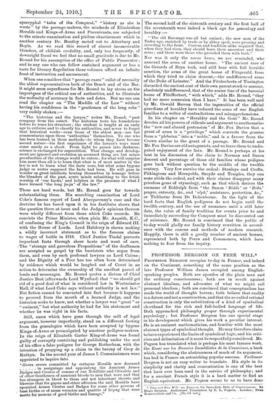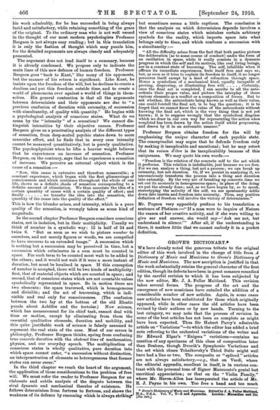PROFESSOR BERGSON ON FREE WILL.* PROFESSOR BERGSON occupies to-day in
France, and indeed on the Continent, something of the same position as the late Professor William James occupied among English- speaking peoples. Both are apostles of the plain man and the ordinary consciousness ; both are in, revolt against abstract idealism, and advocates of what we might call personal idealism ; both are convinced that conceptualism has made the world of thought barren ; both believe that reality is a datum and not a construction, and that the so-called rational construction is only the substitution of a kind of symbolical shorthand for the rich and full-bodied language of life. Both approached philosophy proper through experimental psychology ; but Professor Bergson has one special stage in his development which gives his work a peculiar interest. He is an eminent mathematician, and familiar with the most abstract types of symbolical thought. He may therefore claim to have experienced the limits of symbolical logic, and his criti- cism and delimitation of it must be respectfully considered. Mr. Pogson has translated what is perhaps his most famous work, the Essai any lea Donn&s Immediates de la Conscience, a book which, considering the abstruseness of much of its argument, has had in France an astonishing popular success. Professor Bergson is not an easy writer to translate. His style in its simplicity and clarity and concentration is one of the best that have ever been used in the service of philosophy; and for a succinct French style it is a hard matter to find an English equivalent.. Mr. Pogson seems to us to have done • Time and Free Will :.an Essay on the Immediate Data of Consciousness. By Henri Bergson. Authorised Translation by F. L. Pogson. London : Swan Sonnenschein and Co. LIOs. Ga. net.]
his work admirably, for be has succeeded in being always lucid and satisfactory, while retaining something of the grace of the original. To the ordinary man who is not well -versed in the thought of our most modern psychologists Professor Bergson is not always easy reading ; but in this translation it is only the fashion of thought which may puzzle him, for the detailed arguments are always clearly and adequately presented.
The argument does not lend itself to a summary, because it is already condensed. We propose only to indicate the main lines of this new defence of human freedom. Professor Bergson goes " back to Kant," like many of his opponents,
but the manner of his return is significant. Like Kant, be insists upon the freedom of the will, but he declines to create a dualism and put this freedom outside time, and to create a world of phenomena over against a world of things in them-
selves. His general contention is that all the arguments between determinists and their opponents are due to " a previous confusion of duration with extensity, of succession with simultaneity, of quality with quantity." He begins with a psychological analysis of conscious states. What do we mean by the " intensity " of a sensation ? We cannot dis- tinguish intensities by their objective causes. Professor Bergson gives us a penetrating analysis of the different types of sensation, from deep-seated psychic states down to mere muscular effort, and he finds that in every case intensity cannot be measured quantitatively, but is purely qualitative.
The psychophysicist when he lifts a heavier weight believes that he experiences an increase of sensation. Professor Bergson, on the contrary, says that he experiences a sensation
of increase. We perceive an external object which is the cause of a sensation :— " Now, this cause is extensive and therefore measurable; a constant experience, which began with the first glimmerings of consciousness and which continues throughout the whole of our life, shows us a definite shade of sensation corresponding to a definite amount of stimulation. We thus associate the idea of a certain quantity of cause with a certain quality of effect ; and
finally we transfer the idea into the sensation, the quantity of the cause into the quality of the effect."
This is how the blunder arises, and intensity, which is a pure
quality of the sensation, is wrongly taken as some kind of magnitude.
In the second chapter Professor Bergson considers conscious states, not in isolation, but in their multiplicity. Usually we think of number in a symbolic way : 12 is half of 24 and twice 6. " But as soon as we wish to picture number to
ourselves, and not merely figures or words, we are compelled to have recourse to an extended image." A succession which is nothing but a succession may be perceived in time, but a succession which culminates in a sum must be counted in space. For each term to be counted must wait to be added to
the others ; and it would not wait if it were a mere instant of duration, but must be localised in space. If this conception of number is accepted, there will be two kinds of multiplicity: first, that of material objects which are counted in space; and second, that of conscious states which are not countable unless symbolically represented in space. So in motion there are two elements : the space traversed, which is homogeneous and divisible ; and the act of traversing, which is indi- visible and real only for consciousness. (The confusion between the two lay at the bottom of the old Eleatic puzzle about Achilles and the tortoise.) Now science, which has measurement for its chief task, cannot deal with time or motion, except by eliminating from them the essential qualitative elements, duration and mobility, and this quite justifiable work of science is falsely assumed to represent the real state of the case. Most of our errors in philosophy, Professor Bergson thinks, spring from confusing true concrete duration with the abstract time of mathematics, physics, and our everyday speech. The multiplication of conscious states is wholly qualitative, pure duration into which space cannot enter, "a succession without distinction, an interpenetration of elements so heterogeneous that former states can never recur."
In the third chapter we reach the heart of the argument, the application of these considerations to the problem of free will. We must refer the reader to Professor Bergson for an elaborate and subtle analysis of the dispute between the rival dynamic and mechanical theories of existence. He follows determinism from fortress to fortress, and shows the weakness of its defence by reasoning which is always striking° but sometimes seems a little captious. The conclusion is that the analysis on which determinism depends involves a view of conscious states which mistakes certain arbitrary symbols for the reality, which imports space into what belongs only to time, and which confuses a succession with a simultaneity :-
" All the difficulty arises from the fact that both parties picture the deliberation [as to some course of conduct] under the form of an oscillation in space, while it really consists in a dynamic progress in which the self and its motives, like real living beings, are in a constant state of becoming. The self, infallible when it affirms its immediate experiences, feels itself free and says so; but, as soon as it tries to explain its freedom to itself, it no longer perceives itself except by a kind of refraction through space. Hence a symbolism of a mechanical kind, equally incapable of proving, disproving, or illustrating free will Certainly, once the final act is completed, I can ascribe to all the ante- cedents their proper value, and picture the interplay of these various elements as a conflict or a composition of forces. But to ask whether, the antecedents being known as well as their value, one could foretell the final act, is to beg the question; it is to forget that we cannot know the value of the antecedents without knowing the final act, which is the very thing that is not yet known; it is to suppose wrongly that the symbolical diagram which we draw in our own way for representing the action when completed has been drawn by the action itself whilst progressing, and drawn by it in an automatic manner."
Professor Bergson obtains freedom for the will by emphasising the unique character of each psychic state. The conceptualist may argue that he defends freedom only by making it inexplicable and unrational ; but he may retort that its raison d'elre is its inexplicability because of this uniqueness. We may quote his own words :-
" Freedom is the relation of the concrete self to the act which it performs. This relation is indefinable, just because we are free. For we can analyse a thing, but not a process ; we can break up extensity, but not duration. Or, if we persist in analysing it, we unconsciously transform the process into a thing and duration into extensity. By the very act of breaking up concrete time we set out its moments in homogeneous space ; in place of the doing we put the already done ; and, as we have begun by, so to speak, stereotyping the activity of the self, we see spontaneity settle down into inertia and freedom into necessity. Thus, any positive definition of freedom will involve the victory of determinism."
Mr. Pogson very appositely prefixes to his translation a sentence of Plotinus :—" If a man were to inquire of Nature the reason of ber creative activity, and if she were willing to give ear and answer, she would say—' Ask me not, but understand in silence.'" After all, if the understanding is there, it matters little that we cannot embody it in a pocket definition.











































 Previous page
Previous page